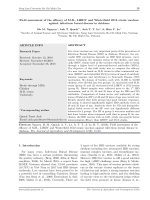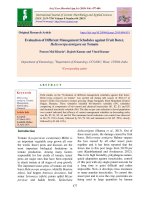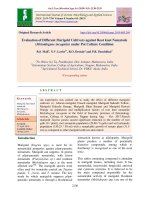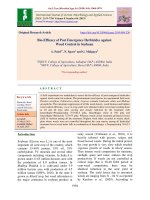Efficacy of different IPM modules against melon fruit fly and american serpentine leaf miner of cucumber
Bạn đang xem bản rút gọn của tài liệu. Xem và tải ngay bản đầy đủ của tài liệu tại đây (172.46 KB, 6 trang )
Int.J.Curr.Microbiol.App.Sci (2019) 8(9): 1240-1245
International Journal of Current Microbiology and Applied Sciences
ISSN: 2319-7706 Volume 8 Number 09 (2019)
Journal homepage:
Original Research Article
/>
Efficacy of Different IPM Modules against Melon Fruit Fly and American
Serpentine Leaf Miner of Cucumber
S. A. Sarade, A. S. Bagde*, P. B. Mohite and V. M. Karade
Department of Entomology, R.C.S.M. College of Agriculture, Kolhapur- 416004 (MS), India
*Corresponding author
ABSTRACT
Keywords
Cucumber, Fruit
fly, Serpentine leaf
minor
Article Info
Accepted:
12 August 2019
Available Online:
10 September 2019
Field experiment was conducted during Rabi season of 2017-18 with nine
modules, replicated thrice, in the ‘Randomized Block Design’ with gross
plot size 4.00 m x 3.00 m.As regards with melon fruit fly infestation, the
module M7 (15.82 per cent) was found most effective at1st, 2nd, 3rd, 4th and
5th pickings. The next best module M4 (19.43 per cent) and M5 (22.12 per
cent). The module M7 (23.82 per cent) was found most superior in reducing
American serpentine leaf miner population at 25, 45 and 65 days after
sowing. Followed by module M4 (25.80 per cent) and M5(28.74 per cent).
Introduction
Cucumber, (Cucumis sativus L.), which is one
of the monocecious annual crops of the cool
climate belongs to the cucurbitacaceae family
comprising 118 genera and 825 species.
Fruit fly, B. cucurbitae is one of the most
destructive pests often rendering cultivation of
cucumber unprofitable.
The fruit are damaged by the maggots of this
fly as the female fly lays it eggs in the tissues
of fruits. The maggots feed on flesh and look
like rotten fruits. Hence, present investigation
was undertaken to study the efficacy of
different IPM modules against melon fruit fly
and American serpentine leafminer of
cucumber under natural infestation in the field
conditions.
Materials and Methods
The field experiments was conducted during
Rabi season of 2017-18 with local Kheera
variety of cucumber with Nine treatments
replicated Thrice in the ‘Randomized Block
Design’ with gross plot size 4.00 m x 3.00 m
carried out during Rabi 2017-18 at Post
Graduate Research Farm, Department of
Horticulture, RCSM College of Agriculture,
Kolhapur.
1240
Int.J.Curr.Microbiol.App.Sci (2019) 8(9): 1240-1245
Method of recording observations
Results and Discussion
The observations of fruit fly damage were
recorded at weekly interval throughout the
crop season.
Efficacy of different modules against fruit
infestation by melon fruit fly (B. cucurbitae
Coq.) of cucumber
The damaged and healthy fruits were recorded
at each picking for recording fruit infestation
by fruit flies. . (Dubale et al., 2018)
Data pertaining to the survival population of
melon fruit fly of cucumber on number basis
at each picking are presented in Table 2. All
the modules were found to be significantly
superior in reducing population of melon fruit
fly when observations were recorded at 1st,
2nd,3rd,4th,5th, picking.
Percent fruit infestation
Total number of damaged fruits
=---------------------------------------- X 100
Total number of observed fruits
Observations on per cent damaged leaves by
American leaf miner were recorded on
randomly selected three plants in each plot for
these purpose five plants per plot were tagged.
The observations were recorded by counting
total number of leaves per plant and number of
leaf miner infested leaves. The per cent
damage of leaves was expressed as below.
Percent damage of leaves
No. of leaf miner infested leaves
=------------------------------------------- X 100
Total number of leaves
Statistical analysis
In order to compare the treatment effect based
on generated data of field experiments, the
natural
counts
were
subjected
to
transformation as per statistical methods
suggested by Panse and Sukhatme, (1967).
The data on pest infestation based on
calculated percentage were transformed to arc
sine values in respect of melon fruit fly, e and
serpentine leaf miner infestation.
From the overall performance of all the
modules it was found that all the modules
were significantly superior over control in
reducing melon fruit fly infestation. The
module M7 (15.82 per cent) was found as the
best treatment with 56.26 per cent reduction
over control. The next promising modules in
decreasing order were M4 (19.43 per cent),
M2 (22.12 per cent), M6 (24.76 per cent), M5
(27.15 per cent) and M1 (29.66 per cent)
which are found equally effective in next
order of efficacy. The module M3 (31.51 per
cent) and M8 (33.49 per cent) were least
effective.
These results are confirmative with result of
Golvankar et al.,(2018) the results on efficacy
of insecticides against fruit flies infesting
cucumber indicated that spinosad 45 SC @
0.014 per cent was the best treatment which
recorded minimum (15.38%) mean fruit
infestation and was at par with emamectin
benzoate 5 SG @ 0.002 per cent (20.49%).
Efficacy of different modules against
American serpentine leaf miner (L. trifolii
Burgess) of cucumber
Data pertaining to the survival population of
leaf miner of cucumber on number basis at
each picking are presented in Table 3.
1241
Int.J.Curr.Microbiol.App.Sci (2019) 8(9): 1240-1245
Table.1 Module details for pest complex of cucumber
Sr.No.
M1.
M2.
M3.
M4.
M5.
M6.
M7.
M8.
M9.
Module Details
Soil application of Carbofuran 10%G @ 15 Kg/ha + erection of yellow sticky traps(1-2 traps
@50-100 m2) + foliar spray of NSE 5% + spaying of Indoxacarb 14.55%SC @ 0.5ml/L.
Soil application of Trichoderma viridae @ 3-5 Kg/ha + poison bait(Malathion 20ml + 20L water
+ 50g molasses) + Metarhizium anisopliae @ 5 g/L + foliar spray of Deltametrin 1.8%EC @
1.25ml/L.
Spaying of Pseudomonas fluorescens @ 4-6 g/L + erection of Cue lure trap + spraying of
Lecanicilicium laccani @ 5g/L + foliar spray of Propergite 57%EC @ 2ml/L.
Spraying of Spirotetramate 15%OD @ 1 ml/L + foliar spray of NSE 5% + spraying of Beauveria
bassiana @ 5g/L + spraying of Flubendamide 39.35%SC @ 0.1ml/L.
Trap crop Marigold (Two rows) + spraying of Flonicamide 50%WG @ 0.3gm/L + spraying of
Metarhizium anisopliae @ 5 g/L + foliar spray of Chloranatriniprole18.5%SC @ 0.25ml/L.
Trap crop French bean (Two rows) + spraying of Dinotefuron 20%SG @ 0.25g/L + foliar spray
of NSE 5% + spraying of Abamectin 1.9% EC 0.5ml/L.
Trap crop Maize (Two rows) + spraying of Indoxacarb 14.55%SC @0.5ml/L + spraying of
Metarhizium anisopliae@ 5 g/L + spraying of NSE 5%.
Trap crop Mustard (Two rows) + soil application of Phorate 10%G @ 15 Kg/ha + spraying of
Metarhizium anisopliae@ 5 g/L + spraying of Acephate 75%SP @ 0.5 g/L.
Untreated control.
1242
Int.J.Curr.Microbiol.App.Sci (2019) 8(9): 1240-1245
Table.2 Efficacy of different modules against melon fruit fly on cucumber
Module
M1
M2
M3
M4
M5
M6
M7
M8
Percent fruit infestation at different pickings
1st Picking 2nd
3rd
4th
Picking
Picking
Picking
5
Picking
Mean
28.11
30.33
31.96
28.88
29.02
29.66
(32.09)*
(33.42)
(34.43)
(32.51)
(32.60)
(33.00)
20.88
23.14
23.97
21.72
20.89
22.12
(27.19)
(28.75)
(29.31)
(27.78)
(27.20)
(28.06)
29.96
32.62
33.21
31.11
30.64
31.51
(33.19)
(34.83)
(35.19)
(33.90)
(33.61)
(34.15)
18.21
19.86
20.7
19.97
18.42
19.43
(25.26)
(26.46)
(27.06)
(26.54)
(25.42)
(26.16)
25.96
28.73
29.11
26.76
25.17
27.15
(30.63)
(32.41)
(32.65)
(31.15)
(30.11)
(31.40)
23.38
26.08
26.86
24.37
23.11
24.76
(28.92)
(30.71)
(31.22)
(29.58)
(28.73)
(29.84)
14.08
16.46
17.86
16.11
14.57
15.82
(22.039)
(23.94)
(25.00)
(23.66)
(22.44)
(23.43)
31.88
34.58
35.06
33.46
32.46
33.49
(34.38)
(36.02)
(36.31)
(35.34)
(34.73)
(35.36)
37.11
38.08
37.03
35.11
36.17
(37.53)
(38.10)
(37.48)
(36.34)
(36.97)
0.94
0.89
1.01
0.86
33.51
M9.
Untreated
(35.37)
control
1.15
S.E.±
th
C.D.(5%)
3.46
2.83
1.26
3.05
2.60
CV
7.92
5.89
5.41
6.60
5.88
DAS = Days after sowing
*Figures in parentheses are arcsine transformed value
1243
Per cent
Reduction
over
control
18.00
38.84
12.88
46.28
24.94
31.55
56.26
7.41
Int.J.Curr.Microbiol.App.Sci (2019) 8(9): 1240-1245
Table.3 Efficacy of different modules against serpentine leaf miner on cucumber
Module
M1
M2
M3
M4
M5
M6
M7
M8
Percent leaf mines infestation/plant
Pre count
25 DAS
45 DAS
41.19
(39.93)*
42.63
(40.76)
42.98
(40.96)
40.32
(39.42)
42.6
(40.74)
42.94
(40.94)
40.35
(39.44)
41.17
(39.91)
41.24
(39.95)
NS
NS
32.5
(34.76)
31.38
(34.07)
26.67
(31.09)
27.81
(31.83)
32.53
(34.77)
32.26
(34.61)
26.34
(30.88)
33.63
(35.44)
34.94
(36.23)
0.82
2.48
5.40
26.3
(30.85)
19.32
(26.07)
30.65
(33.62)
16.1
(23.66)
24.76
(29.84)
21.43
(27.58)
12.91
(21.06)
29.71
(33.03)
31.76
(34.30)
1.10
3.30
7.45
65 DAS
Mean
29.31
(32.78)
21.64
(27.72)
33.47
(35.35)
18.98
(25.83)
27.27
(31.48)
24.24
(29.49)
15.67
(23.32)
33.44
(35.33)
34.4
(35.91)
0.87
2.60
6.18
32.33
(34.65)
28.74
(32.42)
33.44
(35.33)
25.80
(30.53)
31.79
(34.32)
30.22
(33.35)
23.82
(29.21)
34.49
(35.96)
35.59
(36.62)
-
Untreated
control
S.E.±
C.D.(5%)
CV
DAS= Days after sowing
*Figures in the parentheses are arcsine transformed value
All the modules were found to be significantly
superior in reducing population of leaf miner
when observations were recorded at 25,45,65
DAS.
From the overall performance of all the
modules it was found that all the modules
were significantly superior over control in
reducing per cent leaf miner infestation.
The module M7 (23.82 per cent) was found as
the best treatment with 33.07 per cent
reduction over control. The next promising
modules in decreasing order were M4 (25.80
Per
cent
Reduction
over control
9.16
19.25
6.04
27.51
10.68
15.09
33.07
3.09
per cent), M2 (28.74per cent) and M6 (30.22
per cent) which are found equally effective in
next order of efficacy.
The module M5 (31.79 per cent) was found
least effective. These results are confirmative
with the results Desai (2018) revealed that on
efficacy of different insecticides against L.
trifolii through foliar sprays. The abamectin
1.9EC at 0.00057% was most effective
treatment for suppression Liriomyza trifolii
and it was followed by cartap hydrochloride
50 SP at 0.05%.
1244
Int.J.Curr.Microbiol.App.Sci (2019) 8(9): 1240-1245
References
Dubale, M.M., Jalgaonkar, V. N., Golvankar
K. V. and Munj A. Y. 2018. Studies on
incidence of fruit flies in relation to
weather parameters parameters on
ridge gourd in Konkan region. J. of
Entomology and Zoology Studies 2018:
6(5): 2012-2014.
Desai, N. R., C. S. Bhoge, D. B. Pawar and R.
S. Bhoge.2018. Bioefficacy of
Different Insecticides against Leaf
Minor
(Liriomyza
trifolii)
on
Cucumber and Their Effect on Natural
How to cite this article:
Enemies. Int.J.Curr.Microbiol.App.Sci
(2018) Special Issue-6: 2392-2395
2392
Golvankar, G., Naik, K. V., Shinde, P. B., ang
Jaldaonkar, V. N. 2018. Bio-efficacy
of insecticides against fruit flies
infesting cucumber. Int. J. of Chemical
Stuidies 2018; 6(5): 1681-1684.
Panse, V. G. and Sukhatme, P. V. 1967.
Statistical Method for Agricultural
Workers. Second edition. Indian
Council of Agricultural Research. New
Delhi, 38 1p.
Sarade, S. A., A. S. Bagde, P. B. Mohite and Karade, V. M. 2019. Efficacy Of Different IPM
Modules against Melon Fruit Fly and American Serpentine Leaf Miner of Cucumber.
Int.J.Curr.Microbiol.App.Sci. 8(09): 1240-1245. doi: />
1245









